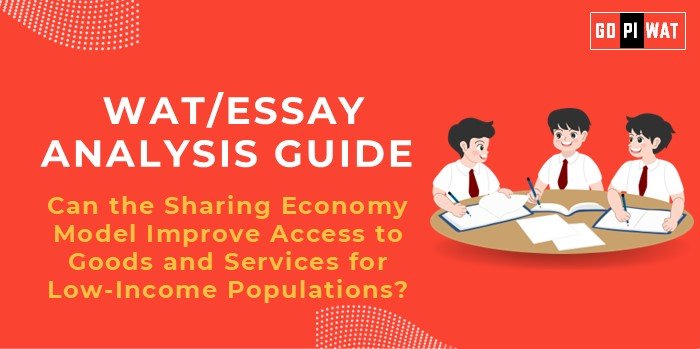📋 Written Ability Test (WAT) / Essay Analysis Guide: Can the Sharing Economy Improve Access for Low-Income Populations?
🌍 Understanding the Topic’s Importance
💡 The sharing economy impacts sectors like housing, transport, and delivery, directly linking to issues of equity and inclusion. It is a vital topic for B-schools, connecting business models with societal impact.
🕒 Effective Planning and Writing
- ⏱️ Time Allocation:
- 📖 Planning: 5 minutes.
- ✍️ Writing: 20 minutes.
- 🔍 Review: 5 minutes.
📝 Introduction Techniques for Essays
- 🔄 Contrast Approach: “While the sharing economy democratizes access, its benefits often elude rural, low-income populations.”
- 💡 Solution-Based Approach: “By combining technology and underutilized assets, the sharing economy presents a path to reducing poverty, if inclusion challenges are addressed.”
📋 Structuring the Essay Body
- 🏆 Achievements:
- ✨ Highlight platforms like Uber and Airbnb reducing costs and improving accessibility.
- ⚠️ Challenges with Comparative Analysis:
- 📉 Discuss the digital divide in India compared to Estonia’s universal internet access.
- 🚀 Future Outlook:
- 📚 Recommend increasing digital literacy and regulatory frameworks to safeguard inclusivity.
🎯 Concluding Effectively
- ⚖️ Balanced Perspective: “While promising, the sharing economy’s success depends on ensuring inclusivity and protecting worker rights.”
- 🌍 Global Comparison: “Learning from Estonia and China, India can expand its sharing economy by enhancing digital infrastructure and regulatory clarity.”
📄 Sample Short Essays
- ⚖️ Balanced Perspective: “The sharing economy enables low-income populations to access affordable goods and services. However, its reliance on technology and exploitation risks necessitate targeted interventions to ensure inclusivity.”
- ✨ Solution-Oriented: “Through regulatory support and digital infrastructure, the sharing economy can bridge gaps in access, empowering underserved populations sustainably.”
- 🌐 Global Comparison: “India can learn from Estonia’s universal digital access to make the sharing economy more inclusive for its low-income citizens.”


